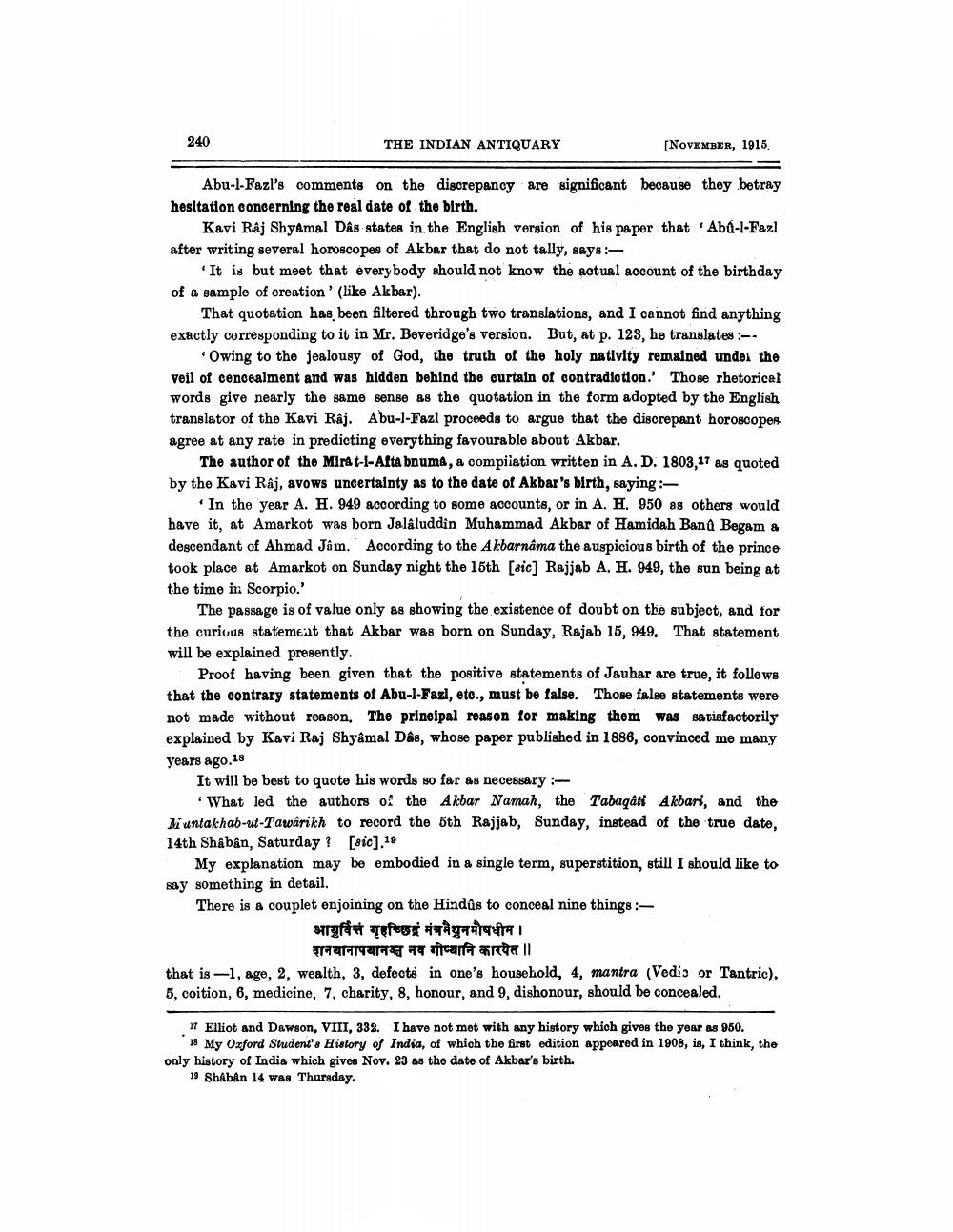________________
240
THE INDIAN ANTIQUARY
[NOVEMBER, 1915.
Abu-l-Fazl's comments on the discrepancy are significant because they betray hesitation concerning the real date of the birth.
Kavi Raj Shyamal Dâs states in the English version of his paper that Abu-l-Fazl after writing several horoscopes of Akbar that do not tally, says:
'It is but meet that everybody should not know the actual account of the birthday of a sample of creation' (like Akbar).
That quotation has been filtered through two translations, and I cannot find anything exactly corresponding to it in Mr. Beveridge's version. But, at p. 123, he translates :--
Owing to the jealousy of God, the truth of the holy nativity remained under the veil of cencealment and was hidden behind the curtain of contradiction.' Those rhetorical words give nearly the same sense as the quotation in the form adopted by the English translator of the Kavi Râj. Abu-l-Fazl proceeds to argue that the discrepant horoscopes agree at any rate in predicting everything favourable about Akbar.
The author of the Mira t-i-Afta bnuma, a compilation written in A. D. 1803,17 as quoted by the Kavi Râj, avows uncertainty as to the date of Akbar's birth, saying:
In the year A. H. 949 according to some accounts, or in A. H. 950 as others would have it, at Amarkot was born Jalaluddin Muhammad Akbar of Hamidah Banû Begam a descendant of Ahmad Jâm. According to the Akbarnama the auspicious birth of the prince took place at Amarkot on Sunday night the 15th [sic] Rajjab A. H. 949, the sun being at the time in Scorpio.'
The passage is of value only as showing the existence of doubt on the subject, and for the curious statement that Akbar was born on Sunday, Rajab 15, 949. That statement will be explained presently.
Proof having been given that the positive statements of Jauhar are true, it follows that the contrary statements of Abu-l-Fazl, etc., must be false. Those false statements were not made without reason. The principal reason for making them was satisfactorily explained by Kavi Raj Shyamal Dâs, whose paper published in 1886, convinced me many years ago.18
It will be best to quote his words so far as necessary :
'What led the authors of the Akbar Namah, the Tabaqâti Akbari, and the Muntakhab-ut-Tawarikh to record the 5th Rajjab, Sunday, instead of the true date, 14th Shâbân, Saturday? [sic].19
My explanation may be embodied in a single term, superstition, still I should like to say something in detail.
There is a couplet enjoining on the Hindûs to conceal nine things:
gef velgedete i दानयानापयान नव गोप्यानि कारयेत ॥
that is -1, age, 2, wealth, 3, defects in one's household, 4, mantra (Vedic or Tantric),
5, coition, 6, medicine, 7, charity, 8, honour, and 9, dishonour, should be concealed.
17 Elliot and Dawson, VIII, 332. I have not met with any history which gives the year as 950. 18 My Oxford Student's History of India, of which the first edition appeared in 1908, is, I think, the only history of India which gives Nov. 23 as the date of Akbar's birth.
19 Shaban 14 was Thursday.




